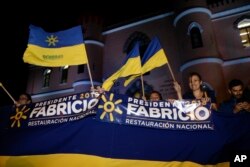Costa Rica is voting for a new president Sunday in a campaign roiled by a debate over same-sex-marriage.
Thirteen candidates are looking to succeed outgoing President Luis Guillermo Solis, who is constitutionally barred from seeking a second consecutive term, but there is no clear favorite. If no candidate wins 40 percent, the two leading contenders will meet in an April 1 runoff election.
Polls in the socially conservative Central American country show Christian singer and television anchor Fabricio Alvarado vaulting to the top of the large field of candidates with only 17 percent support, after he denounced last month's ruling by the Inter-American Court of Human Rights ordering Costa Rica to give equal civil marriage rights to gay and lesbian couples.
More than a third of the likely voters say they are undecided.
"We have to stand up to those who want to trample on the family," Alvarado said.
One key rival, Antonio Alvarez, a banana entrepreneur with the opposition National Liberation Party, said he personally opposes the court ruling but would respect it if he wins.
Carlos Alvarado of the governing Citizens' Action Party, no relation to his same-named opponent, is the only major candidate to openly support gay marriage, and has collected some support from more socially liberal voters.
Polls show about two-thirds of Costa Ricans oppose same-sex marriage, although gay and lesbian couples can marry in Argentina, Brazil, Colombia, Uruguay and parts of Mexico.
There are 3.3 million eligible voters in Costa Rica. They are predominantly Roman Catholic and often describe themselves as conservative.





